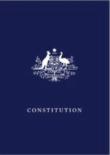AustLit
Latest Issues
Publication Details of Only Known VersionEarliest 2 Known Versions of
Works about this Work
-
Poetry, Law, and the News : Re-reading the Australian Constitution
2019
single work
criticism
— Appears in: Australian Humanities Review , May no. 64 2019; 'This paper sits within a larger Project reading contemporary poetry that takes legal texts and histories as source material. My interest is in poetry that engages with the law in order to render legal concepts readable in new ways: readable, for example, as poems that reveal the poetics of law-making and enforcing; and readable as alternative or ‘counter-archival’ (Motha and van Rijswijk) accounts of the legal histories that underscore state power and sovereignty. Since I am a scholar of poetry and not the law, my interest is in how poetry can catalyse critical, interdisciplinary inquiry into discursive practices outside the literary, as well as advance and challenge literary studies through the invocation of an expanded field of language and meaning—that is, through the invocation of ‘poetics’ as both concept and method. In this sense, my project has two related questions or aims,the first of which is rather pragmatic and the second decidedly more abstract: how can poetry offer a model for reading that can be mobilised elsewhere in order to study the performativity, contingency, and ambiguity of language in places where we might ordinarily (and erroneously) imagine discourse to be more fixed; and, how can a reading of the poetics of legal texts and histories contribute to whatNicole M.Rizzuto calls ‘insurgent testimony’, and Divya Victor calls ‘appropriative witnessing’—textual forms that seek to intervene in and de-form dominant modes of representation that constitute imperial, colonial, and national discourses. My aim is to take seriously the idea that both law and history are predicated on unstable and anxious archives (Stoler)that are open to new readings and critical reconfigurations—and, to take seriously the idea that poetry plays a vital role in such re-readings.' (Introduction) -
Review Short : Amelia Dale’s Constitution and Yasmin Heisler’s Aquarium Drift
2018
single work
review
— Appears in: Cordite Poetry Review , 1 February no. 84 2018; -
Tony Messenger Reviews Constitution by Amelia Dale
2017
single work
essay
— Appears in: Mascara Literary Review , December no. 21 2017;'Ben Lerner in his 2016 essay “The Hatred of Poetry” reminds us of poetry’s activist, historical participation in politics; “Plato, in the most influential attack on poetry in recorded history, concluded that there was no place for poetry in the Republic because poets are rhetoricians who pass off imaginative projections as the truth and risk corrupting citizens of the just city, especially the impressionable youth.” Sydney poet, Amelia Dale, has taken Australian poetic political agitation to a new level, with her new book, Constitution.' (Introduction)
-
December in Poetry
2017
single work
column
— Appears in: Overland [Online] , December 2017;
-
Review Short : Amelia Dale’s Constitution and Yasmin Heisler’s Aquarium Drift
2018
single work
review
— Appears in: Cordite Poetry Review , 1 February no. 84 2018; -
December in Poetry
2017
single work
column
— Appears in: Overland [Online] , December 2017; -
Tony Messenger Reviews Constitution by Amelia Dale
2017
single work
essay
— Appears in: Mascara Literary Review , December no. 21 2017;'Ben Lerner in his 2016 essay “The Hatred of Poetry” reminds us of poetry’s activist, historical participation in politics; “Plato, in the most influential attack on poetry in recorded history, concluded that there was no place for poetry in the Republic because poets are rhetoricians who pass off imaginative projections as the truth and risk corrupting citizens of the just city, especially the impressionable youth.” Sydney poet, Amelia Dale, has taken Australian poetic political agitation to a new level, with her new book, Constitution.' (Introduction)
-
Poetry, Law, and the News : Re-reading the Australian Constitution
2019
single work
criticism
— Appears in: Australian Humanities Review , May no. 64 2019; 'This paper sits within a larger Project reading contemporary poetry that takes legal texts and histories as source material. My interest is in poetry that engages with the law in order to render legal concepts readable in new ways: readable, for example, as poems that reveal the poetics of law-making and enforcing; and readable as alternative or ‘counter-archival’ (Motha and van Rijswijk) accounts of the legal histories that underscore state power and sovereignty. Since I am a scholar of poetry and not the law, my interest is in how poetry can catalyse critical, interdisciplinary inquiry into discursive practices outside the literary, as well as advance and challenge literary studies through the invocation of an expanded field of language and meaning—that is, through the invocation of ‘poetics’ as both concept and method. In this sense, my project has two related questions or aims,the first of which is rather pragmatic and the second decidedly more abstract: how can poetry offer a model for reading that can be mobilised elsewhere in order to study the performativity, contingency, and ambiguity of language in places where we might ordinarily (and erroneously) imagine discourse to be more fixed; and, how can a reading of the poetics of legal texts and histories contribute to whatNicole M.Rizzuto calls ‘insurgent testimony’, and Divya Victor calls ‘appropriative witnessing’—textual forms that seek to intervene in and de-form dominant modes of representation that constitute imperial, colonial, and national discourses. My aim is to take seriously the idea that both law and history are predicated on unstable and anxious archives (Stoler)that are open to new readings and critical reconfigurations—and, to take seriously the idea that poetry plays a vital role in such re-readings.' (Introduction)




